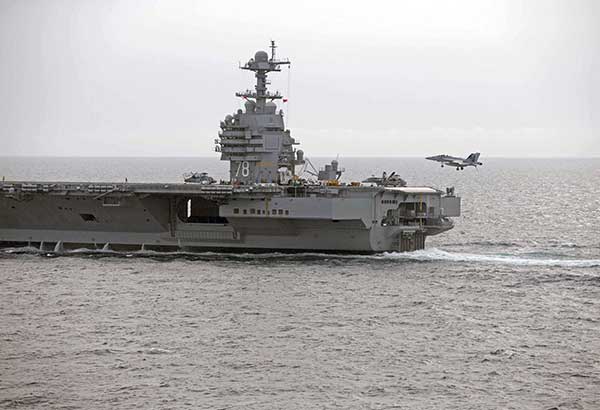South China Sea: US more determined to conduct FONOPs

With the front page story carried by The Philippine Star yesterday about the United States’ determination to conduct freedom of navigation operations (FONOPs) and challenge “excessive sea claims” anywhere in the world, I guess it’s now really out in the open that there will be a lot of maneuvering activities in the South China Sea in the next few months.
Last Thursday, the USS John S. McCain sailed within 12 nautical miles of Panganiban (Mischief) Reef in the Spratlys where China had built artificial structures. It can be recalled that the Permanent Arbitration Court at The Hague issued a ruling that practically invalidated China’s “nine-dash-line” claims over the South China Sea and upheld the Philippines’ sovereign rights over Panganiban Reef.
Sources disclosed that much earlier, US President Donald Trump already gave the green light to the Pentagon’s plan to conduct regular FONOPs to curb China’s “excessive claims” over almost all of the South China Sea. One year into his term, Trump has already allowed the conduct of three FONOPs – in contrast with Barack Obama who stopped freedom of navigation operations from 2012 to 2015, only allowing the conduct of three FONOPs during his last year in office.
The fact is, even the UK is planning to send a warship to the South China Sea next year for freedom of navigation exercises, with UK Defense Minister Michael Fallon saying that they plan to expand their presence in the region, adding that his country will not be constrained by China from sailing through the South China Sea.
“We have the right of freedom of navigation and we will exercise it,” Fallon said, disclosing that RAF Typhoon aircraft also flew over the South China Sea last October. As AFP spokesperson Brigadier General Resty Padilla said, freedom of navigation is guaranteed to everyone as long as it is conducted within the bounds of international law.
This “pivot to Asia” seems to be really happening now with the US military expanding its footprint across the Asia-Pacific region. In Japan alone, there are almost 40,000 US personnel stationed across 112 bases in Japan, with a fleet of armed aircraft from helicopters and surveillance planes of the 18th Wing recently showcased at Kadena Airbase. Let’s not forget, the Seventh Fleet – the biggest deployed force in the US Navy – is headquartered in Japan. In South Korea – where the US has more than 23,000 personnel on active duty – the Terminal High Altitude Area Defense (THAAD) system has been installed. The THAAD system has interceptor missiles that can destroy incoming missiles in mid-flight. Guam, of course, is dubbed as a “permanent aircraft carrier” for obvious reasons.
Undoubtedly, the visit of Donald Trump in November is going to be very critical because it is also the occasion where the US president is expected to interact with the leaders of the Association of South East Asian Nations (ASEAN) and gather support for US moves within the region, particularly with regard to the problem with North Korea whose nuclear ambitions are making a lot of nations antsy.
Hopefully, China will realize the danger posed by North Korea, whose leader Kim Jong Un, has been threatening and insulting the US over the years. This time, however, many hawks in the US are saying, “enough is enough, we will no longer put up with North Korea’s nuclear blackmail” – especially now that the USS Gerald Ford has been commissioned. Touted as the world’s most technologically advanced warship, the USS Gerald Ford is so modern that it can practically sail itself. At a cost of $13 billion, the super carrier can accommodate up to 90 aircraft including Super Hornets, F-35C Lightning IIs, Growlers, Grumman C-2 Greyhounds, Seahawk helicopters and unmanned combat aerial vehicles, to name a few.
In any case, it would seem China is not willing to go against the sentiments of the international community, judging from a state-owned paper’s editorial that told North Korea “you’re on your own” if the Asian nation goes after the US first – although China also warned the US that it would intervene if Washington attacks first.
Can you just imagine, the arena could be in this part of the world – which is why Filipinos should be concerned about these recent developments, along with the threat of ISIS that is staring us in the face as underscored by the crisis in Marawi City. Now more than ever, the Philippines should band together with countries such as Malaysia, Singapore and Indonesia who are also concerned about terrorism and the threat of ISIS gaining a foothold in Asia.
It also goes without saying that we should work even more closely with our allies like Australia, Japan and the United Sates to curb the spread of terrorism and other transnational crimes. Clearly, we have to continue building up our military to achieve more than “minimum credible defense posture” to protect our borders from international terrorists and criminals.
* * *
Email: [email protected]
- Latest
- Trending

























